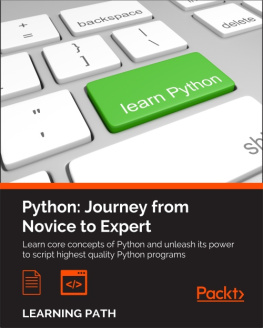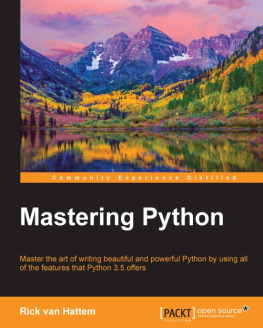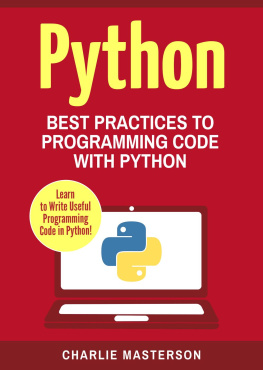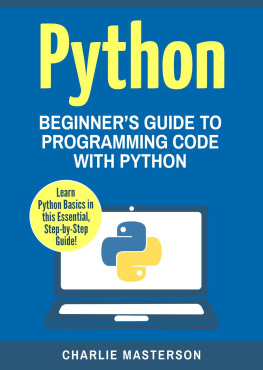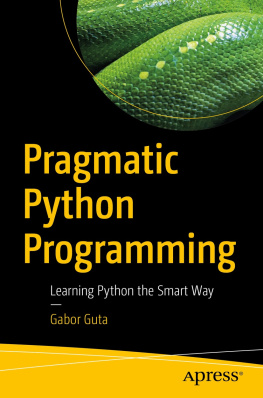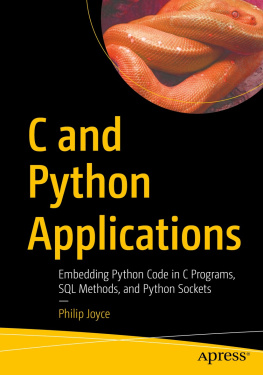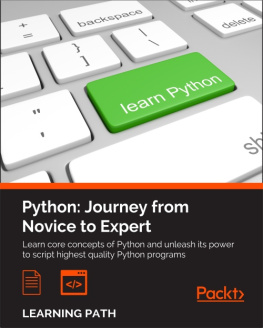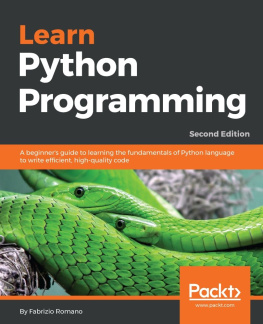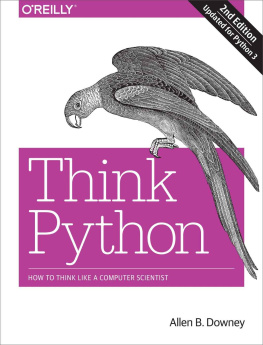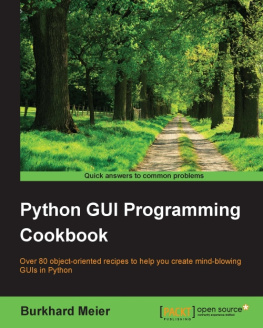I. de Hoogt
Preface
Python is a dynamic programming language. It is known for its high readability and hence it is often the first language learned by new programmers. Python being multi-paradigm, it can be used to achieve the same thing in different ways and it is compatible across different platforms. Coding in Python minimizes development time and increases productivity in comparison to other languages. Clean, maintainable code is easy to both read and write using Python's clear, concise syntax.
What this learning path covers
, Learning Python , This module begins by exploring the essentials of programming, data structures and teaches you how to manipulate them. It then moves on to controlling the flow of a program and writing reusable and error proof code. You will then explore different programming paradigms that will allow you to find the best approach to any situation, and also learn how to perform performance optimization as well as effective debugging. Throughout, the module steers you through the various types of applications, and it concludes with a complete mini website built upon all the concepts that you learned.
, Python 3 Object-Oriented Programming, Second Edition , You will learn how to use the Python programming language to clearly grasp key concepts from the object-oriented paradigm. This modules fully explains classes, data encapsulation, inheritance, polymorphism, abstraction, and exceptions with an emphasis on when you can use each principle to develop a well-designed software. You'll get an in-depth analysis of many common object-oriented design patterns that are more suitable to Python's unique style. This module will not just teach Python syntax, but will also build your confidence in how to program and create maintainable applications with higher level design patterns.
, Mastering Python , This module is an authoritative guide that will help you learn new advanced methods in a clear and contextualized way. It starts off by creating a project-specific environment using venv, introducing you to different Pythonic syntax and common pitfalls before moving on to cover the functional features in Python. It covers how to create different decorators, generators, and metaclasses. It also introduces you to functools.wraps and coroutines and how they work. Later on you will learn to use asyncio module for asynchronous clients and servers. You will also get familiar with different testing systems such as py.test, doctest, and unittest, and debugging tools such as Python debugger and faulthandler. You will learn to optimize application performance so that it works efficiently across multiple machines and Python versions. Finally, it will teach you how to access C functions with a simple Python call. By the end of the module, you will be able to write more advanced scripts and take on bigger challenges.
What you need for this learning path
Module 1:
You are encouraged to follow the examples in this module. In order to do so, you will need a computer, an Internet connection, and a browser. The module is written in Python 3.4, but it should also work with any Python 3.* version. It has written instructions on how to install Python on the three main operating systems used today: Windows, Mac, and Linux. This module also explained how to install all the extra libraries used in the various examples and provided suggestions if the reader finds any issues during the installation of any of them. No particular editor is required to type the code; however, module suggest that those who are interested in following the examples should consider adopting a proper coding environment.
Module 2:
All the examples in this module rely on the Python 3 interpreter. Make sure you are not using Python 2.7 or earlier. At the time of writing, Python 3.4 was the latest release of Python. Most examples will work on earlier revisions of Python 3, but you are encouraged to use the latest version to minimize frustration. All of the examples should run on any operating system supported by Python.
If this is not the case, please report it as a bug. Some of the examples need a working Internet connection. You'll probably want to have one of these for extracurricular research and debugging anyway! In addition, some of the examples in this module rely on third-party libraries that do not ship with Python. These are introduced within the module at the time they are used, so you do not need to install them in advance. However, for completeness, here is a list:
- pip
- requests
- pillow
- bitarray
Module 3:
The only hard requirement for this module is a Python interpreter. A Python 3.5 or newer interpreter is recommended, but many of the code examples will function in older Python versions, such as 2.7, with a simple from __future__ import print_statement added at the top of the file.Additionally, Chapter 14, Extensions in C/C++, System Calls, and C/C++ Librariesrequires a C/C++ compiler, such as GCC, Visual Studio, or XCode. A Linux machine is by far the easiest to execute the C/C++ examples, but these should function on Windows and OS X machines without too much effort as well.
Who this learning path is for
This course is meant for programmes who wants learn Python programming from a basic to an expert level. The course is mostly self-contained and introduces Python Programming to a new reader and can help him become an expert in this trade. Intended for students and practitioners from novice to experts.

